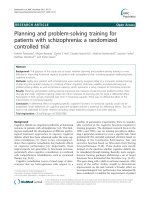programming and problem solving with c++ 6th by dale ch09
Bạn đang xem bản rút gọn của tài liệu. Xem và tải ngay bản đầy đủ của tài liệu tại đây (407.69 KB, 34 trang )
Chapter 9
Scope, Lifetime, and
More on Functions
Chapter 8 Topics
●
●
●
●
●
●
●
Local Scope vs. Global Scope of an Identifier
Detailed Scope Rules to Determine which
Variables are Accessible in a Block
Determining the Lifetime of a Variable
Writing a Value-Returning Function for a Task
Some Value-Returning Functions with
Prototypes in Header Files cctype and cmath
Creating and Using a Module Structure Chart
Stub Testing a Program
Scope of Identifier
The scope of an identifier
(or named constant) is the region of program code
in which it is legal to use that identifier for any purpose
Local Scope vs. Global Scope
●
The scope of an
identifier that is
declared inside a
block (this
includes function
parameters)
extends from the
point of
declaration to the
end of the block
●
The scope of an
identifier that is
declared outside of
all namespaces,
functions, and
classes extends
from point of
declaration to the
end of the entire
file containing the
program code
const
float
void
float
TAX_RATE = 0.05; // Global constant
tipRate;
// Global variable
handle (int, float);
// Function prototype
using
namespace
int
{
std;
main ()
int
age;
// age and bill local to this block
float
bill;
.
// a, b, and tax cannot be used here
.
// TAX_RATE and tipRate can be used
handle (age, bill);
return 0;
}
void
{
handle (int a,
float
.
.
}
tax;
float b)
// a, b, and tax local to this block
// age and bill cannot be used here
// TAX_RATE and tipRate can be used
Detailed Scope Rules
1 Function names have global scope
2 A function parameter’s scope is identical
to the scope of a local variable declared
in the outermost block of the function body
3 A global variable’s (or constant’s) scope
extends from its declaration to the end of
the file, except as noted in rule 5
4 A local variable’s (or constant’s) scope
extends from its declaration to the end of
the block in which it is declared,
including any nested blocks, except as
noted in rule 5
5 An identifier’s scope does not include any
nested block that contains a locally
declared identifier with the same name
(local identifiers have name precedence)
Name Precedence Implemented
by Compiler Determines Scope
●
When an expression refers to an identifier,
■
The compiler first checks the local declarations
■
If the identifier isn’t local, the compiler works outward through
each level of nesting until it finds an identifier with same name
where it stops
●
Any identifier with the same name declared
at a level further out is never reached
●
If compiler reaches global declarations and
still can’t find the identifier, an error
message results
Namespace Scope
●
The scope of an identifier
declared in a namespace
definition extends from the
point of declaration to the end
of the namespace body, and its
scope includes the scope of a
using directive specifying that
namespace
3 Ways to Use Namespace Identifiers
■
Use a qualified name consisting of the
namespace, the scope resolution operator ::
and the desired the identifier
alpha = std::abs(beta);
■
Write a using declaration
using std::abs;
alpha = abs(beta);
■
Write a using directive locally or globally
using namespace std;
alpha = abs(beta);
Name Precedence
(or Name Hiding)
●
When a function declares a local
identifier with the same name as
a global identifier, the local
identifier takes precedence
within that function
Memory Allocation
int
someInt;
// For the global variable
int
{
Square (int n) // For instructions in body
int result;
// For the local variable
result = n * n;
return result;
}
No Memory Allocation
int
Square (int n);
// Function prototype
extern
int
someInt;
// someInt is defined in another file
// and is thus global to everything in
// this file
Lifetime of a Variable
●
The lifetime of a variable is the time during program execution in which an identifier
actually has memory allocated to it
Lifetime of Local Automatic
Variables
●
Their storage is created (allocated) when control enters the function
●
Local variables are “alive” while function is executing
●
Their storage is destroyed (deallocated) when function exits
Lifetime of Global Variables
●
Their lifetime is the lifetime of the entire program
●
Their memory is allocated when program begins execution
●
Their memory is deallocated when the entire program terminates
Automatic vs. Static Variable
●
Storage for
automatic
variable is
allocated at
block entry and
deallocated at
block exit
●
Storage for
static variable
remains
allocated
throughout
execution of the
entire program
Default Allocation
●
Local variables are automatic
●
To obtain a static local
variable, you must use the
reserved word static in its
declaration
Static and Automatic
Local Variables
int
{
popularSquare(int
n)
static int timesCalled = 0;
// Initialized only once
int result = n * n;
// Initialized each time
timesCalled = timesCalled + 1;
cout << “Call # “ << timesCalled
return result;
}
<< endl;
Data Flow Determines
Passing-Mechanism
Parameter Data Flow
PassingMechanism
Incoming
/* in */
Pass-by-value
Outgoing
/* out */
Incoming/outgoing
/* inout */
Pass-by-reference
Pass-by-reference
Prototype for float Function
AmountDue() is a function with 2 parameters
The first is type char, the other is type int
float AmountDue (char, int);
This function calculates and returns the
amount due for local phone calls
The char parameter contains either a ‘U’ or
an ‘L’ indicating Unlimited or Limited
service; the int variable contains the
number of calls made
Assume Unlimited service is $40.50 per month
and limited service is $19.38 for up to 30
calls, and $.09 per additional call
float AmountDue (char kind, int calls)
// Two parameters
{
float result; // One local variable
const
float
UNLIM_RATE = 40.50,
LIM_RATE = 19.38,
EXTRA = .09;
if (kind ==‘U’)
result = UNLIM_RATE;
else if ((kind == ‘L’) && (calls <= 30))
result = LIM_RATE;
else
result = LIM_RATE + (calls - 30) * EXTRA;
return result;
}
#include <iostream>
#include <fstream>
float AmountDue (char,
using namespace std;
void
{
int);
// Prototype
main ()
ifstream myInfile;
ofstream myOutfile;
int
areaCode, phoneNumber, calls;
int
count = 0;
float
bill;
char
service;
. . . . . .
// Open files
while (count < 100)
{
myInfile >> service >> phoneNumber >> calls;
bill = AmountDue (service, calls); // Function call
myOutfile << phoneNumber << bill << endl;
count++;
}
. . . . . .
// Close files
}
To handle the call
AmountDue(service, calls)
MAIN PROGRAM MEMORY
Locations:
4000
4002
4006
200
?
‘U’
calls
bill
service
TEMPORARY MEMORY for function to use
Locations:
7000
calls
7002
result
7006
kind
Handling Function Call
bill = AmountDue(service, calls);
●
Begins by evaluating each argument
●
A copy of the value of each is
sent to temporary memory which is
created and waiting for it
●
The function body determines
result
●
Result is returned and assigned to
bill
int
Power (/* in */
/* in */
int
int
x, // Base number
n) // Power
// This function computes x to the n power
// Precondition:
//
x is assigned && n >= 0 && (x to the n) <= INT_MAX
// Postcondition:
//
Return value == x to the n power
{
int result;
// Holds intermediate powers of x
result = 1;
while (n > 0)
{
result = result * x;
n--;
}
return result;
}









